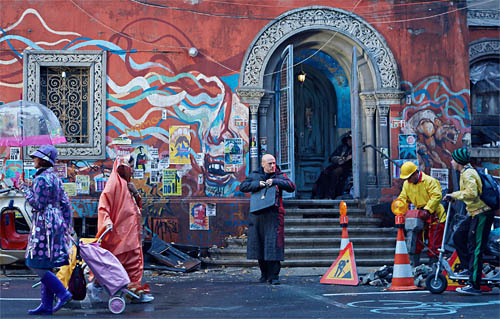THE ZERO THEOREM by Terry Gilliam
 The Zero Theorem has been bashed in some critiques mostly composed of the same old tirades that accompany analysis of most of Gilliam’s works and point a vulgar finger towards faults that could be summed up in one expression – over indulgence. Yet, in reality, The Zero Theorem seems to be the most rewarding work the visionary filmmaker has made in at least ten years.
The Zero Theorem has been bashed in some critiques mostly composed of the same old tirades that accompany analysis of most of Gilliam’s works and point a vulgar finger towards faults that could be summed up in one expression – over indulgence. Yet, in reality, The Zero Theorem seems to be the most rewarding work the visionary filmmaker has made in at least ten years.
The film is set in a ‘timeless future’ world which nicely draws parallels with what is arguably his ultimate masterpiece Brazil, a film with which it shares a lot of the same the same comments and concerns on the martyrdom of the working class. Christoph Weltz plays a man who is visibly physically and mentally scarred, perhaps by a self-imposed illness due to a somewhat masochistic lifestyle that sees him leading and empty existence in perpetual attendance of a call that might reveal to him the meaning of life.
 While the ethical observations on the frustration of the working class, which touches on many themes such as religion, love and sex, is nothing particularly new, Gilliam successfully brings Pat Rushin’s screenplay to life in the most creative of ways and manages to keep the film together and compact.
While the ethical observations on the frustration of the working class, which touches on many themes such as religion, love and sex, is nothing particularly new, Gilliam successfully brings Pat Rushin’s screenplay to life in the most creative of ways and manages to keep the film together and compact.
On top of that, the restricted size of the budget leads to a wonderful and unique art direction and overall visual look that feels unusual and fresh in the science fiction genre. Furthermore, a hairless Christoph Weltz turns in a brave lead performance as the computer genius and shows a great connection with Gilliam and his imagination.